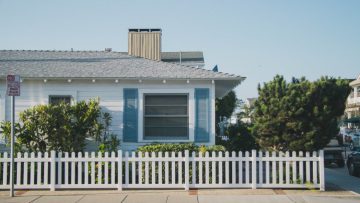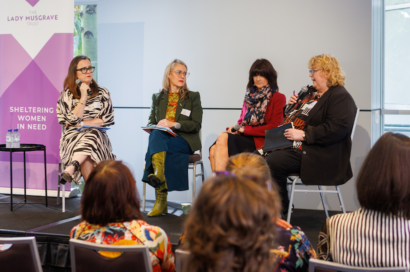
Finding housing for women over 50 in Queensland
Sep 18, 2023
As the number of older women experiencing housing stress and homelessness continues to rise in Australia, the challenges faced by this demographic become increasingly complex.
These difficulties include financial hardship, housing affordability, access to public housing, and the need for greater community understanding regarding senior rentals and retirement villages.
A safe and stable home is an essential foundation for older women. For these resilient women, two fundamental needs stand out: the importance of security and the desire for independent living.
In this article, we’ll explore the different housing options targeted at the ‘over 50s’ population, with a focus on the Queensland context.
Housing options for older women
While there are a multitude of housing alternatives for individuals in their golden years, these options can often be shrouded in misconceptions. It’s not uncommon to hear remarks like, “I’d never live in one of those places.” Negative sentiments often revolve around the misconceptions that have plagued caravan parks, seniors’ developments and retirement villages.
However, it’s important to set aside any judgement and take the time to uncover what these housing options actually entail. The world of over 50s housing is a multifaceted landscape that caters to a range of preferences and needs, and offers opportunities for those seeking a comfortable and secure housing solution.
Let’s take a closer look at the diverse range of housing options available.
Private rentals
Renting a home through a real estate agent is the predominant method of securing housing in Australia. Over time, more Queenslanders have turned to private rentals as the proportion of homeowners has gradually declined. While common, private rentals can be challenging due to the initial and ongoing costs, the insecurity of tenure, potential conflicts with landlords, and limited disabled access.
If you’re open to sharing a house with others, more affordable options can be found on platforms like Flatmates.com.au. Additionally, the Queensland Department of Housing offers assistance in the form of Bond Loans and rental grants for those embarking on a new rental journey. Other resources such as the Rental Tenancies Authority’s advice line and Tenants Queensland can provide guidance.
Social housing
Social housing offers rentals for individuals with low-to-moderate income. It includes public housing, managed by state and territory governments, and community housing, often overseen by nonprofit organisations. This option is favoured for its affordability and tenure security, particularly in the case of age-specific public housing.
Nonprofit organisations play a crucial role in facilitating access to affordable housing for low or below-average incomes, through initiatives such as the Community Rent Scheme (CRS), Long Term Community Housing (LTCH), Community Managed Studio Units (CMSU), & the National Rental Affordability Scheme (NRAS).
Build-to-rent
Build-to-rent developments have become increasingly popular among retirees and cost-conscious individuals looking to downsize.
Unlike traditional rentals, build-to-rent involves developers constructing and retaining ownership of homes or apartments within dedicated communities. These developments offer an array of amenities similar to retirement villages, including recreational spaces, gardens, pools, cinemas, and gyms. With longer lease terms, lower or no bonds, pet-friendly policies, and customisable interiors, build-to-rent provides flexibility and adaptability to changing circumstances.
However, it’s important to assess the impact on age pension eligibility and consider the differences in ownership and security compared to retirement villages. While build-to-rent is often promoted as affordable housing, costs can vary depending on the amenities and services offered, requiring a careful examination of contracts to ensure a seamless downsizing experience.
Boarding houses and hostels
Private boarding houses are regulated housing options for seniors seeking affordable accommodations. They may also provide special services, such as meals, linen, cleaning, assistance with medication, showering and finances, for a contracted weekly payment.
Residential service facilities are regulated by the Residential Services (Accreditation) Act 2002. They are privately operated and do not receive government funding.
Caravans
If the idea of living in a caravan intrigues you, you can either purchase a caravan and permanently place it in a caravan park, or acquire an existing caravan located on a permanent site.
Site costs in caravan parks can vary significantly, so thorough research is advisable. It’s wise to plan ahead, and consider whether you’d like to try out different parks. If so, ensure your caravan is roadworthy and easily movable.
Keep in mind that each caravan park has its own unique community and management style, so trying one for a while is a good idea before making a definitive decision. Tenancy laws in Queensland cover permanent residents in caravan parks, whether they are renting a site only or a van owned by the park.
Tiny houses
You may have seen these charming small homes on social media and TV, often featuring lofts and decks, providing a stylish alternative to traditional caravans.
If your tiny home is on wheels, your options for parking it and living permanently are typically limited to caravan parks. However, living permanently in a tiny home on your land or a friend’s land could pose challenges in most local government areas throughout Queensland.
If the tiny house lacks wheels, it may be installed as a secondary dwelling.
Manufactured homes in residential parks
A manufactured home is a dwelling that resembles a traditional house, but is specifically designed for relocation.
Often referred to as mobile or transportable homes, approximately 25,000 Queenslanders have opted to live in such homes within residential parks. These parks come in various forms, occasionally accommodating both tourists and permanent residents. Notably, there is a rising trend in the development of parks exclusively aimed at individuals aged 50 and above, providing permanent housing options tailored to this demographic.
The appeal of this housing option lies in its affordability, on-site recreational amenities, low maintenance requirements, and the sense of security that comes from living among peers of a similar age. In a manufactured home park, residents typically own the dwelling while leasing the land or site where their home is situated.
For eligible lower-income homeowners, this arrangement may open doors to rent assistance through Centrelink, providing support with site rental expenses. Residents are responsible for maintaining their homes and may encounter certain restrictions on modifications and timelines for specific maintenance tasks.
Most parks exclusively permit owner-occupants, but occasional parks may offer rental units, so be sure to inquire when visiting potential sites.
Retirement villages
Retirement villages are dynamic communities where older individuals reside in independent living units or serviced units, sharing access to communal facilities and amenities. Some retirement villages may also incorporate a Resident Aged Care facility, previously known as a Nursing Home, which operates under separate regulations.
Other terms used to describe these housing forms include retirement living, retirement villages, lifestyle villages, manufactured home parks, resort-style developments, seniors’ rental housing, and over 50s resorts, among others.
The allure of retirement villages lies in their strong sense of community, low maintenance, security, additional services, on-site activities, and overall convenience in daily living. While many of these developments can be on the higher end in terms of cost, there are also more budget-friendly alternatives available, both for rental and purchase.
Residents in retirement villages typically hold a leasehold tenure, often structured as a 99-year lease. However, conditions can diverge significantly between different retirement villages, underscoring that the decision to move into one is primarily a lifestyle choice rather than a property investment.
The fundamental structure entails an entry fee, which varies widely but secures a lifetime leasehold. Additionally, residents are required to pay monthly fees covering maintenance, village management, rates, grounds maintenance, and access to common facilities, with specific amenities varying from site to site.
In the event of departure or passing away, an exit fee may be imposed, subtracted from the entry fee, and the remaining amount refunded to the resident. Fee structures can be intricate, so it’s important to seek legal and financial counsel before signing any contracts.
It's worth noting that certain retirement villages offer units for rent, without requiring an upfront contribution. To explore this option, consult the provider's website and inquire about rental availability during your visit to the retirement village.
Critical considerations for Over 50s housing
As with all housing decisions, careful research is needed. To help you make informed decisions, here are some essential questions to ask:
1. Legal understanding: Are you well-versed in the distinct legal structures governing the housing option you choose?
2. Financial clarity: What are the financial implications at the entry, ongoing, and exit stages? Ensure you have a grasp of your financial obligations at each stage.
3. Community compatibility: Is the local area conducive to your lifestyle? Assess factors like job opportunities, access to services, and the ease of maintaining your social connections and community involvement.
4. Community appeal: Does the specific housing community align with your preferences and values?
5. In-depth inquiry: Look beyond the marketing pitch. Ask detailed questions about how the housing arrangement operates. Who is responsible for internal maintenance? Can you make improvements to your unit? Are pets allowed?
6. Budgeting: Analyse both present and future costs. How will your finances be impacted in the long run?
7. Flexibility: Can you relocate to another unit within the same community, and if so, what are the associated fees?
By asking these key questions, you can navigate the landscape of over 50s housing with confidence, ensuring that your housing choice aligns with your unique needs and preferences.
Resources for older women
The Handy Guide for Older Women
Since 2019, The Lady Musgrave Trust has distributed The Handy Guide for Older Women – a practical resource designed for older women that provides key information about where to access housing crisis support.
This invaluable guide serves the purpose of educating, informing, and empowering older women who are either experiencing homelessness or are at risk of it.
In early 2023, The Lady Musgrave Trust announced the transfer of The Handy Guide for Older Women to Footprints Community, a not-for-profit organisation dedicated to providing community-based services tailored to the needs of older people at risk of homelessness.
Under this new arrangement, Footprints Community will ensure that older women can continue to access the housing support they require.
The Handy Guide for Older Women can be downloaded from Footprints Community’s Housing Older Women website, ensuring that older women have the necessary tools to navigate housing challenges effectively.
Other services:
Seniors Housing Online: Navigating the complexities of retirement villages, seniors rentals (residential services), residential parks, and other senior-focused housing options can be daunting. Seniors Housing Online offers a valuable online directory to simplify your search. While the primary focus is on new retirement villages for sale, a section of the website also advertises Residential Rentals. Keep in mind that prices may vary depending on additional services like meals.
realestate.com.au: As the largest online listing platform for homes in Queensland, realestate.com.au has adapted to the rising trend of ‘Over 50s’ housing. You can find a growing number of listings for such housing options on this site. To conduct a rental search, simply include "retirement living" in your filters.
It’s Your Life: This website is a great resource for learning about retirement living, senior housing, and care of seniors, with information about retirement villages including manufactured home villages and home care. This site covers the whole of Australia, however listings in some areas and categories are limited.




